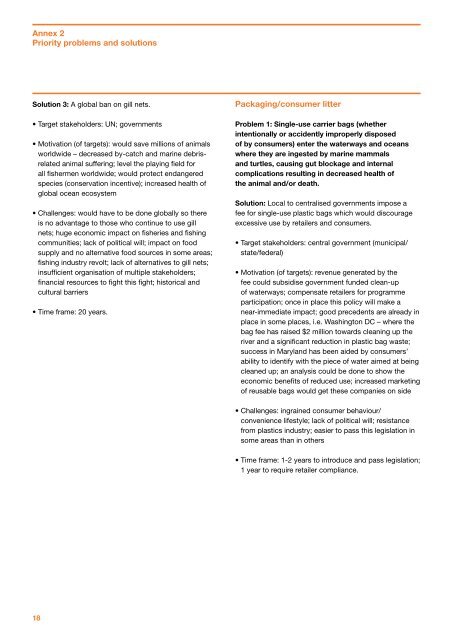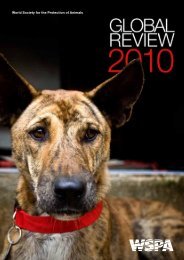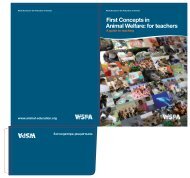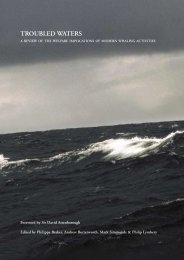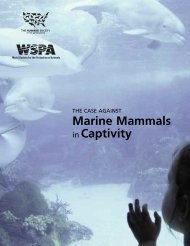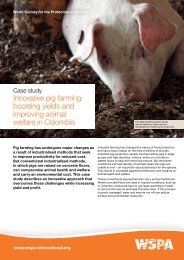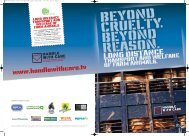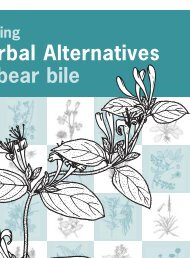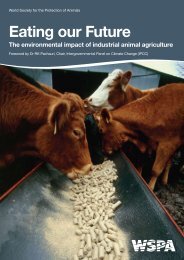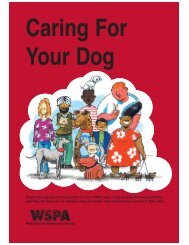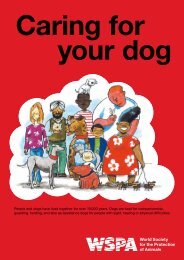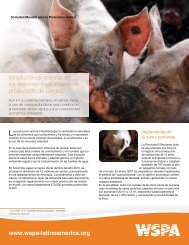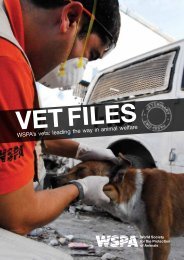Proceedings of the Untangled symposium: - WSPA
Proceedings of the Untangled symposium: - WSPA
Proceedings of the Untangled symposium: - WSPA
You also want an ePaper? Increase the reach of your titles
YUMPU automatically turns print PDFs into web optimized ePapers that Google loves.
Annex 2Priority problems and solutionsSolution 3: A global ban on gill nets.• Target stakeholders: UN; governments• Motivation (<strong>of</strong> targets): would save millions <strong>of</strong> animalsworldwide – decreased by-catch and marine debrisrelatedanimal suffering; level <strong>the</strong> playing field forall fishermen worldwide; would protect endangeredspecies (conservation incentive); increased health <strong>of</strong>global ocean ecosystem• Challenges: would have to be done globally so <strong>the</strong>reis no advantage to those who continue to use gillnets; huge economic impact on fisheries and fishingcommunities; lack <strong>of</strong> political will; impact on foodsupply and no alternative food sources in some areas;fishing industry revolt; lack <strong>of</strong> alternatives to gill nets;insufficient organisation <strong>of</strong> multiple stakeholders;financial resources to fight this fight; historical andcultural barriers• Time frame: 20 years.Packaging/consumer litterProblem 1: Single-use carrier bags (whe<strong>the</strong>rintentionally or accidently improperly disposed<strong>of</strong> by consumers) enter <strong>the</strong> waterways and oceanswhere <strong>the</strong>y are ingested by marine mammalsand turtles, causing gut blockage and internalcomplications resulting in decreased health <strong>of</strong><strong>the</strong> animal and/or death.Solution: Local to centralised governments impose afee for single-use plastic bags which would discourageexcessive use by retailers and consumers.• Target stakeholders: central government (municipal/state/federal)• Motivation (<strong>of</strong> targets): revenue generated by <strong>the</strong>fee could subsidise government funded clean-up<strong>of</strong> waterways; compensate retailers for programmeparticipation; once in place this policy will make anear-immediate impact; good precedents are already inplace in some places, i.e. Washington DC – where <strong>the</strong>bag fee has raised $2 million towards cleaning up <strong>the</strong>river and a significant reduction in plastic bag waste;success in Maryland has been aided by consumers’ability to identify with <strong>the</strong> piece <strong>of</strong> water aimed at beingcleaned up; an analysis could be done to show <strong>the</strong>economic benefits <strong>of</strong> reduced use; increased marketing<strong>of</strong> reusable bags would get <strong>the</strong>se companies on side• Challenges: ingrained consumer behaviour/convenience lifestyle; lack <strong>of</strong> political will; resistancefrom plastics industry; easier to pass this legislation insome areas than in o<strong>the</strong>rs• Time frame: 1-2 years to introduce and pass legislation;1 year to require retailer compliance.18


